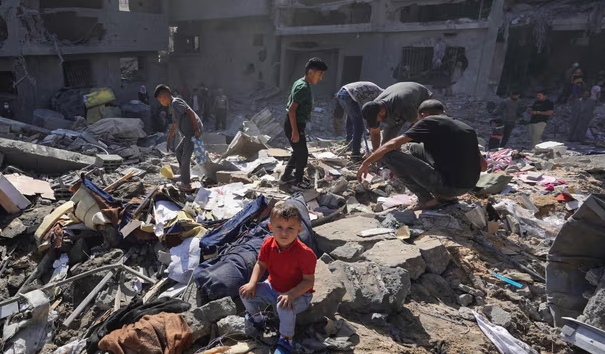The latest Israeli army strikes on the Gaza Strip have caused further casualties and destruction, with international organisations warning that by mid-July more than a million Gazans will face the highest level of hunger.
At least six people were killed and 12 injured when shelling hit the Nuseirat refugee camp in the central Gaza Strip. Several people were injured in a tank attack on Maghazi and Bureij camps south of Nuseirat.
WAFA news agency reported one dead and two wounded in Deir al-Balah, as well as eight casualties in an air raid on eastern Gaza. The news agency notes that more than 37,430 Palestinians, mostly women and children, have been killed and more than 85,650 injured in Gaza since the escalation of the Israeli-Palestinian conflict.
The death toll is also reportedly likely higher as many bodies remain under rubble and on the roads.
Lack of water is a cause of diseases in Gaza
Israel has imposed a complete blockade on the densely populated territory since October last year, depriving more than two million Palestinians living there of fuel, electricity, food and water.
Hundreds of thousands of Gazans whose homes have been destroyed are now forced to live under tents in makeshift camps with little protection from the scorching sun. Getting water, whether clean or not, is a daily struggle. Long queues form at the distribution centres. As the sewerage system is badly damaged and there are few toilets, what water there is is easily contaminated.
Dr Ahmed al-Fari, head of the children’s departments at Nasser Hospital, said:
“It is no secret that the biggest cause of intestinal infections currently occurring in the Gaza Strip is the contamination of the water supplied to these children. The first problem is intestinal infections with vomiting and diarrhoea which causes dehydration. The second problem is hepatitis C or A, which are no less dangerous than intestinal infections, if not more so.”
The UN Office for the Coordination of Humanitarian Affairs says 67 per cent of Gaza’s water and sewage system, which was bad at the best of times, has now collapsed. Salaam Sharab, who is a water engineer in the Khan Younis municipality, said:
“We need a tremendous international effort to re-establish water and sewage networks. We in Khan Younis have lost between 170 and 200km of pipes, which have been completely destroyed, along with wells and water tanks.”
Humanitarian aid is insufficient
The Israeli military says it allows about 200 truckloads of humanitarian aid through the Kerem Shalom crossing every day. The problem is that humanitarian organisations on the other side are not distributing it. Aid workers say the ongoing fighting, especially in the Rafah area of southern Gaza, makes it too dangerous for them to operate. They also say that what they are allowed to bring in is a drop in the ocean compared to what is really needed.
The UN has warned that by mid-July, more than a million Gazans will face the highest level of hunger.
Meanwhile, former Greek finance minister Yanis Varoufakis criticises the Israeli government:
“The Israeli government is laughing out loud as it humiliates the spineless Western governments who think a formal recognition of Palestine is a substitute for boycotting and sanctioning Israel until it stops its ethnic cleansing.”
